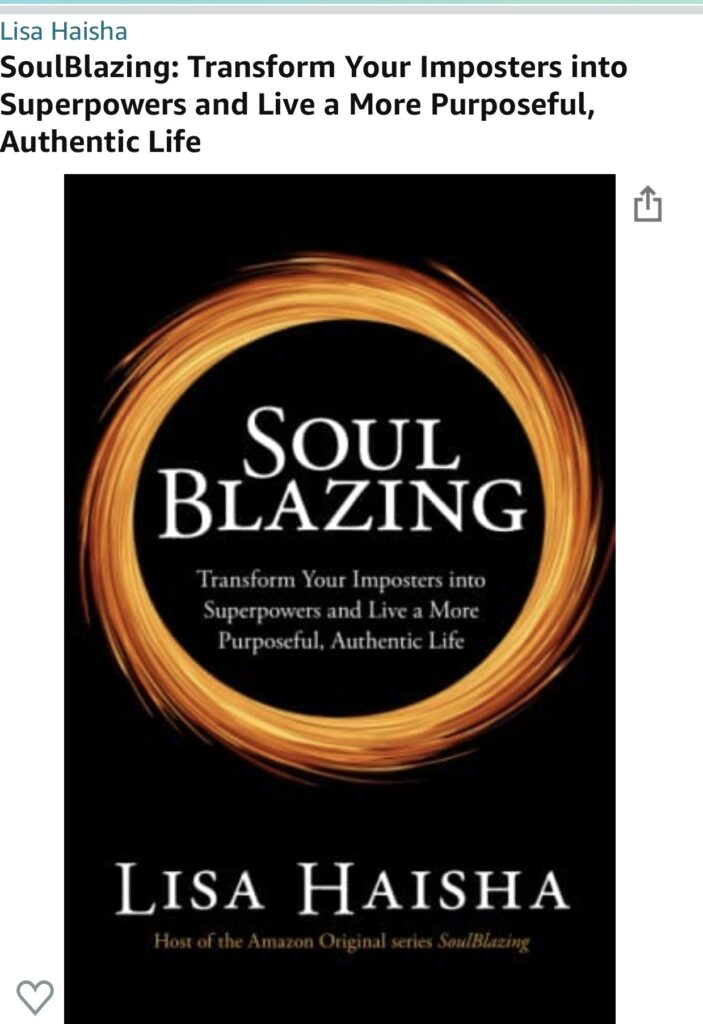Lisa Haisha: Blazing Your Soul

Are you aware of self sabotage? Do you have negative self talk? Were you emotionally wounded in childhood? If so, you need to read Soul Blazing, a book by Lisa Haisha which addresses such questions by exploring the masks that we wear and the imposters we hide behind because of emotional hurts. This book will most definitely help you both pinpoint and then release the emotional pain that impedes your getting to your authentic self. Haisha does this by breaking down the seven archetypical Imposters that plague us. She states that the aim isn’t to completely get rid of the imposters but to learn the positive aspects of them. Soul Blazing offers a series of helpful exercises designed to enable one to examine and come to terms with psychological issues. Haisha does this through a practice she calls SOUL, an acronym for Stop, Observe, Understand, and Liberate. She also uses the SOUL technique in each case study in the book and in her private practice. It was from her private practice that the title of the book was actually derived when a patient told her after a session that Haisha had “blazed her soul.”

Haisha devotes a chapter to the “authentic self,” which she says is connected to our individual purpose and passion in life. The authentic self emerges when one frees oneself from the like of rash judgements, negative talk, fears, and the stigma of one’s imposter. Haisha quotes Carl Jung, who says the only way to get in touch with our authentic selves is to do emotional and psychological housekeeping — in other words, to become conscious. Until you make the subconscious conscious you will keep calling what happens to you “fate” and you will keep running into the same obstacles.
Haisha explores the imposters in depth and further provides exercises to help us eradicate them and the masks we hide behind. She identifies the seven archetypical imposters as: The Victim, The Egotist, The Seductor, The Joker, The Fixer, The Overthinker, and The Judge. She says the imposters are like a series of masks that we wear so long we begin to believe the lie. Each impostor has positive and negative sides.
The Victim Imposter is a manifestation of the most vulnerable part of one that was neglected and wounded in childhood. The Victim’s superpower is empathy, which makes such an individual loving and sensitive; the negative or saboteur traits of Victim impostors are avoidance of taking responsibility for their actions, resorting to blaming, and staying in their comfort zones.

The Egotist Imposter exudes self-confidence and what masquerades as self-love, but deep down has low self-esteem. These impostors have a great ability to attract people and their superpowers are boldness, charisma, and confidence, but their negative traits are insensitivity, self-centeredness, and lack of empathy.
The Seductor Impostor is a pro at flattering people, turning on the charm and displaying false feelings of intimacy in order to influence others. Charming, charismatic, and spontaneous, they can also be manipulative, sly, and secretive.
The Joker Impostor usually develops when a person who had a difficult childhood uses humor to survive. Such impostors often end up sabotaging the very intimacy they desperately crave. On the positive side, they are creative, adventurous, and the life of the party, but on the negative side they are insecure, wounded, and duplicitous.
The Fixer Imposter has a pathological need to fix things, often to the point of dominating others. They are fear-driven in nature, but, on the superpower side, they are solution-oriented and helpful, as well as compassionate and giving.
The Overthinker Impostor has a mind which can not be turned off, mainly because it is so busy overthinking. Over thinkers are killjoys and, as might be expected, heavy procrastinators. On the positive side, they are reliable, detail-oriented, and able to see multiple points of view; nevertheless, they are plagued by second guessing and indecision.
The Judge Impostor is not just personally judgmental, but judgmental of society at large. Characterized by their highly developed sense of right and wrong, pursuit of justice in all matters, and interest in upholding high standards, Judge impostors are wise and honest, but at the same time can be overly critical and self-critical, domineering, and close-minded.
Each type of impostor gets a chapter in Haisha’s book and a SOUL analysis, and therein is the reader’s reward!

It should be noted that imposters are not to be confused with the Imposter Syndrome where highly successful people feel they are imposters.
This is a most important book by Lisa Haisha and needs to be read now because it provides the psychological and spiritual guidance our society desperately needs at this time. Soul Blazing has an easily accessible style, exudes warmth, compassion, and perspicacity, and is clearly the work of an individual dedicated to the well being of the human race.
Lisa Haisha is a brilliant author, life-changing life coach, transformative speaker, and engaging TV host. She has a B.A. in Psychology and a masters in Spiritual Psychology. Her life-enhancing tome Soul Blazing is for sale on Amazon and I purchased several copies for myself and friends. After all, in order to lead our own authentic lives, we all need to embark on the pathway of soul blazing, for how else are we to discard our impostor masks and extract the positives they afford?

